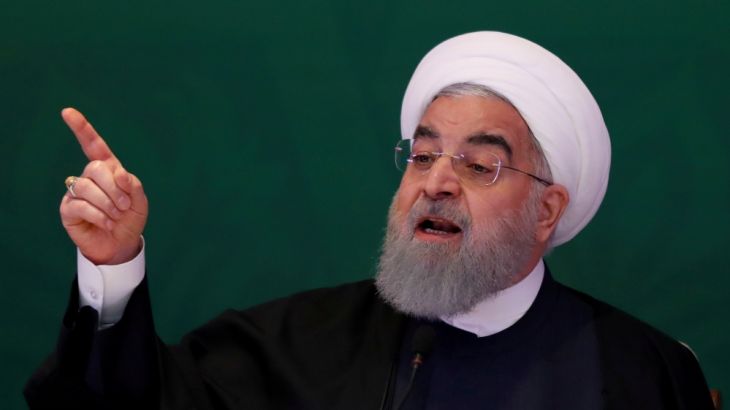Iran to negotiate with world powers to keep nuclear deal in place
Iranian president says US does not ‘respect international agreements’, slams Washington’s ’empty signatures’.

Iranian President Hassan Rouhani has said Tehran will bypass Washington and negotiate with the other signatories of a multinational nuclear deal, calling the US withdrawal from the landmark pact “unacceptable”.
Rouhani’s comments on Tuesday came shortly after US President Donald Trump pulled out of the deal, formally known as the Joint Comprehensive Plan of Action (JCPOA), describing it “defective at its core”.
Keep reading
list of 4 itemsWho will be Iran’s next president? | Start Here
Oil slumps two percent on possible return of Iranian supply
Border security a common concern for Pakistan and Iran: Rouhani
In response, Rouhani said: “If we achieve the deal’s goals in cooperation with other members of the deal, it will remain in place.
“By exiting the deal, America has officially undermined its commitment to an international treaty.”
“I have ordered the foreign ministry to negotiate with the European countries, China and Russia in coming weeks. If at the end of this short period we conclude that we can fully benefit from the JCPOA with the cooperation of all countries, the deal would remain,” he added.
‘Empty signatures’
Under the deal signed in Vienna in 2015 with six world powers – the US, UK, France, Germany, Russia, China and the European Union – Iran scaled back its uranium enrichment programme and promised not to pursue nuclear weapons.
|
|
In exchange, international sanctions were lifted, allowing it to sell its oil and gas worldwide. However, secondary US sanctions remain.
UN inspectors have repeatedly confirmed that Tehran has been meeting its nuclear commitments fully.
“They’ve done nothing except put empty signatures on pieces of paper, without doing anything about it,” Rouhani said in his televised address.
“The Iranian mission, on the other hand, has agreed to everything and accomplished all its responsibilities. We had some duties based on that agreement and we have delivered all of them.
“But today, we can see which is the country that doesn’t respect international agreements. We’ve done nothing wrong – it’s not acceptable that the US is pulling out.”
‘Political clock reset’
Rouhani added that Iran could resume uranium enrichment “without limit” in response to Trump’s decision to withdraw from the nuclear deal.
“I have instructed the Iranian Atomic Energy Organisation to take the necessary measures for future actions so that if necessary we can resume industrial enrichment without limit,” he said on state television.
“We will wait several weeks before applying this decision. We will speak with our friends and allies, the other members of the nuclear agreement.”
|
|
Al Jazeera’s Zein Basravi, reporting from the Iranian capital, Tehran, said Trump’s decision had effectively “reset the political clock in terms of relations between the US and Iran”.
“With the accusatory tone adopted by the Trump administration and defensive tone from Iranian President Hassan Rouhani it is difficult to see where there is common ground for reaching a new agreement,” Basravi said.
“The government is likely to say to its European [signatory] partners and anyone else that will listen that ‘we tried to do it your way and it didn’t work out for us’.”
It is “highly likely” Iran will begin enriching uranium once again following Trump’s decision, Basravi added, saying it would be beneficial for Tehran’s pursuit of a “future nuclear programme for a civilian power grid, and also political leverage”.
“Having said that, Iran is a signatory to the [nuclear] non-proliferation treaty and has said over and over again it … will not pursue a nuclear weapon,” Basravi said.
Spontaneous celebrations erupted across Iran when the deal was signed in 2015, as well as when sanctions were lifted in January 2016, with many Iranians expressing hope of a new era of relations with the US and the West.
‘Dark time’
After the lifting of sanctions on Iran’s economy, Tehran was allowed to resume trading of oil and gas in the international market. A total of $100bn in frozen Iranian assets were also released.
Since then, Iran has gradually opened its country to foreign investments and welcomed more foreign visitors, injecting billions of dollars into its ailing economy.
Rouhani, who campaigned on economic and social reforms in 2013, rode on that success to win re-election in May 2017.
However, some uncertainty had already since the arrival of Trump, who repeatedly criticised the deal during his election campaign, to the White House in January 2017.
“There’s despair, disappointment. I feel no hope,” Bobak, an Iranian architecture graduate who now works in the travel industry, told Al Jazeera after Trump announced his decision.
“I am seriously thinking about leaving Iran,” he said, adding that the economy is in decline.
“My family is feeling a little angry towards Rouhani for not fulfilling his campaign promises, and towards Trump for threatening Iran.”
Amir Havasi, a graduate student, said people are “feeling anxious and sad”.
“The prospect of the deal going down is very concerning – it was the one good development we had in years.”
“As a working-class citizen, I am even more concerned about the future. But I guess it is a darker time for everyone around the world, us included.”
With additional reporting by Ted Regencia in Doha
|
|